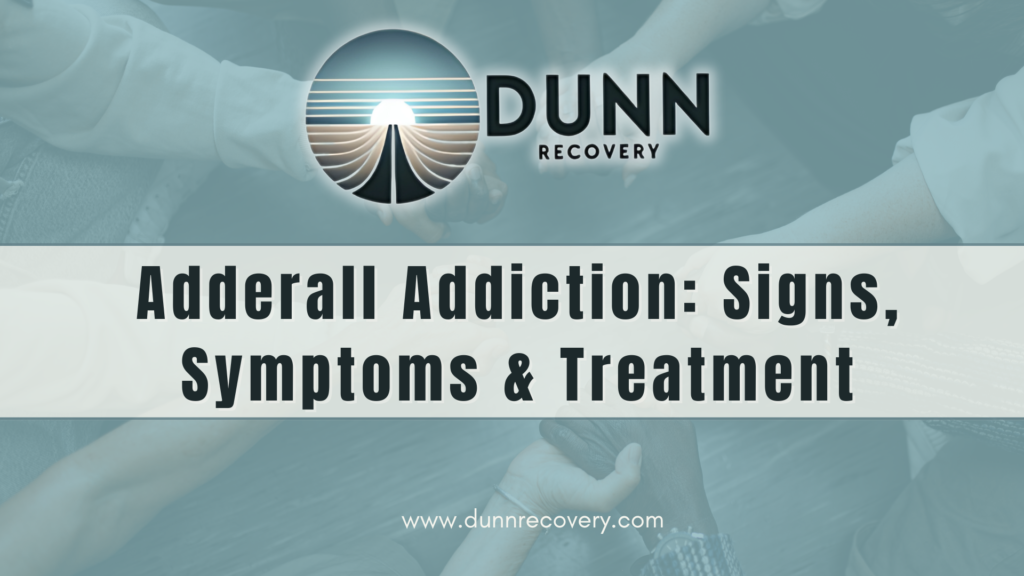Understanding the Growing Crisis of Adderall Addiction and Prescription Stimulant Dependence
Adderall addiction represents one of the most concerning prescription medication dependencies in America today. What begins as a legitimate treatment for Attention-Deficit/Hyperactivity Disorder (ADHD) or narcolepsy can rapidly transform into a destructive pattern of misuse and dependence. At Dunn Recovery, we’ve witnessed firsthand the devastating impact of stimulant addiction on individuals and families, and we’re committed to providing comprehensive education and treatment options.
The prevalence of Adderall misuse has reached alarming levels, with approximately 16 million Americans over the age of 12 having misused prescription stimulants like Adderall at least once in their lifetime, and these numbers continue to rise annually.
What Is Adderall and How Does It Work?
Adderall combines two central nervous system stimulants: amphetamine and dextroamphetamine. As a prescription medication, it’s primarily used to treat ADHD and narcolepsy. But what makes this medication so effective for these conditions also creates its high potential for misuse and addiction.
The Brain Chemistry Behind Adderall Addiction Development
When taken as prescribed, Adderall works by increasing the activity of certain neurotransmitters in the brain, particularly dopamine and norepinephrine. These chemicals are responsible for:
- Dopamine: Controls the brain’s reward and pleasure centers
- Norepinephrine: Affects how the brain responds to events, particularly how it pays attention and the speed at which it reacts to outside stimuli
For individuals with ADHD, these neurotransmitters often function differently, and Adderall helps regulate their levels to improve concentration and reduce impulsive behavior.
From Medical Use to Misuse
The transition from medical use to adderall abuse often begins subtly. Individuals might increase their dosage without medical guidance, seeking enhanced effects or using the medication for purposes other than those prescribed. Common non-prescribed uses include:
- Staying awake for extended periods
- Enhancing academic or work performance
- Experiencing euphoria or a “high”
- Weight loss due to appetite suppression
What many don’t realize is that these misuse patterns quickly lead to tolerance—requiring increasingly higher doses to achieve the same effects—and ultimately, physical and psychological dependence.
Adderall Addiction Symptoms
Recognizing adderall addiction symptoms early can be crucial for intervention and successful recovery. The manifestations of stimulant addiction often develop gradually, making them difficult to identify without knowing what to look for.
Physical Indicators of Adderall Abuse
Physical adderall addiction symptoms often include noticeable changes in appearance and behavior:
- Sleep disturbances: Insomnia followed by periods of excessive sleep
- Appetite changes: Significant weight loss due to decreased hunger
- Cardiovascular effects: Increased heart rate and blood pressure
- Physical appearance: Dilated pupils, dry mouth, frequent sweating
- Energy fluctuations: Periods of hyperactivity followed by extreme fatigue
Psychological and Behavioral Signs
The psychological impact of Adderall addiction can be even more profound than the physical symptoms:
- Mood swings: Irritability, aggression, or anxiety when the medication wears off
- Cognitive changes: Difficulty concentrating without the medication
- Obsessive behaviors: Preoccupation with obtaining and taking Adderall
- Social withdrawal: Declining interest in activities not associated with drug use
- Academic or professional issues: Despite initially using Adderall to enhance performance
A particularly concerning behavioral sign of adderall dependence is “doctor shopping”—visiting multiple healthcare providers to obtain several prescriptions. This behavior indicates the transition from therapeutic use to problematic misuse.

Who Is at Risk for Adderall Addiction? Understanding Vulnerability Factors
While adderall addiction can affect anyone, certain populations demonstrate higher vulnerability to developing problematic use patterns.
High-Risk Demographic Groups
Research has identified several demographics with elevated rates of prescription stimulant misuse:
- College students: Approximately 30% of college students have misused stimulants, primarily for academic performance enhancement
- Young adults (18-25 years): The highest rate of nonmedical stimulant use occurs in this age group
- Healthcare professionals: Due to knowledge of and access to prescription medications
- Individuals with co-occurring mental health conditions: Particularly those with anxiety, depression, or substance use disorders
Genetic and Environmental Risk Factors
Beyond demographics, several factors increase susceptibility to adderall addiction:
- Family history: Having relatives with substance use disorders increases genetic vulnerability
- Early initiation of substance use: Using any substances during adolescence increases later addiction risk
- High-stress environments: Academic, professional, or personal pressure can drive stimulant misuse
- History of trauma: Adverse childhood experiences correlate strongly with later substance misuse
Adderall Withdrawal: Managing the Symptoms of Adderall Addiction Recovery
For those with adderall dependence, attempting to reduce use or stop completely often results in a challenging withdrawal syndrome. Understanding the withdrawal process is essential for successful recovery planning.
Timeline of Withdrawal Symptoms
Adderall withdrawal typically follows a predictable pattern:
Initial Phase (First 24-72 hours)
- Extreme fatigue and increased sleep
- Intense hunger
- Mood changes including irritability and depression
- Strong drug cravings
Acute Phase (Days 4-10)
- Persistent fatigue
- Difficulty concentrating
- Continued mood disturbances
- Sleep irregularities
Post-Acute Phase (Weeks to Months)
- Gradual normalization of sleep and energy
- Lingering mood issues
- Periodic cravings
- Cognitive function improvement
The Importance of Medical Supervision
Attempting to manage adderall withdrawal alone can lead to unnecessary suffering and increased relapse risk. Medical supervision provides several advantages:
- Medication support to manage specific symptoms
- Monitoring for potentially serious complications
- Nutritional support during appetite fluctuations
- Psychological support for emotional symptoms
Our medical team at Dunn Recovery creates individualized withdrawal management plans that address each person’s specific needs during this challenging phase.
Long-Term Effects of Adderall
While immediate concerns often center around addiction and withdrawal, the long-term effects of adderall misuse can impact virtually every body system and life domain.
Physiological Impact
Extended stimulant misuse can lead to lasting or permanent physical health consequences:
- Cardiovascular system: Increased risk of heart attack, stroke, and hypertension
- Neurological effects: Changes in brain structure and function, particularly in reward pathways
- Gastrointestinal issues: Chronic digestive problems and malnutrition
- Dental health: Teeth grinding (bruxism) and decay
- Immune function: Compromised resistance to illness
Psychological Consequences
The mental health impact of prolonged adderall abuse can persist long after stopping the medication:
- Mood disorders: Higher rates of depression and anxiety
- Cognitive changes: Difficulties with memory, attention, and executive function
- Anhedonia: Inability to feel pleasure from naturally rewarding activities
- Sleep architecture disruption: Lasting insomnia or hypersomnia
Social and Functional Deterioration
Beyond physical and psychological effects, chronic adderall addiction often leads to broad life consequences:
- Relationship breakdown: Family conflicts, friendship loss, and romantic relationship difficulties
- Academic or career decline: Despite initial performance enhancement
- Financial strain: Due to purchasing medications illegally or productivity losses
- Legal consequences: Particularly related to illegal acquisition of prescription medications

Adderall Addiction Treatment
Recovery from adderall addiction requires a structured, multifaceted approach tailored to individual needs. Successful adderall addiction treatment typically involves several components implemented in a coordinated manner.
Medical Detoxification
The initial phase of treatment often focuses on safely managing withdrawal symptoms:
- Inpatient monitoring: Providing 24/7 medical supervision during acute withdrawal
- Medication management: Using targeted medications to address specific symptoms
- Nutritional support: Rebuilding physical health after periods of appetite suppression
- Sleep regulation: Establishing healthy sleep patterns
At Dunn Recovery, our medical team provides compassionate, evidence-based detoxification services that prioritize both safety and comfort.
Therapeutic Interventions
After detoxification, psychological treatment becomes the core of recovery:
- Cognitive-Behavioral Therapy (CBT): Addressing thought patterns that perpetuate addiction
- Contingency Management: Providing incentives for abstinence and recovery-oriented behaviors
- Motivational Enhancement: Strengthening internal motivation for lasting change
- Group Therapy: Learning from peers while building supportive relationships
- Family Therapy: Healing relationships damaged by addiction and building recovery support
Addressing Co-Occurring Disorders
Many individuals with adderall addiction also experience other mental health conditions requiring simultaneous treatment:
- Depression and anxiety disorders
- Attention-deficit/hyperactivity disorder (ADHD)
- Post-traumatic stress disorder (PTSD)
- Other substance use disorders
Integrated treatment addressing both addiction and co-occurring conditions leads to significantly better outcomes than treating either issue in isolation.
Stimulant Recovery Programs for Overcoming Adderall Addiction
While general addiction treatment principles apply to all substance use disorders, stimulant recovery programs offer specialized approaches particularly effective for adderall addiction.
The Matrix Model for Stimulant Treatment
The Matrix Model represents one of the most researched and effective approaches specifically for stimulant addiction:
- Structured, time-limited treatment: Typically 16 weeks of intensive intervention
- Integration of multiple therapeutic components: Individual counseling, group therapy, family education, and self-help participation
- Regular drug testing: Providing accountability and objective feedback
- Focus on early recovery skills: Managing cravings, avoiding high-risk situations
This comprehensive model has demonstrated superior outcomes for stimulant users compared to less structured approaches.
Cognitive Rehabilitation Approaches for Healing from Adderall Dependence
Recognizing that stimulants affect cognitive function differently than other substances, specialized cognitive rehabilitation may be incorporated:
- Attention training: Rebuilding concentration abilities without medication
- Memory enhancement strategies: Compensating for memory difficulties during early recovery
- Executive function rehabilitation: Improving planning, organization, and decision-making
- Healthy replacement behaviors: Developing non-drug methods to enhance performance
Recovery from Adderall Addiction: The Journey to Freedom from Stimulant Dependence
While treatment programs provide essential structure and support, recovery ultimately represents a deeply personal journey of transformation. Understanding common elements of successful recovery can provide hope and direction for those beginning this process.
Stages of Change in Adderall Addiction Recovery
Most individuals progress through several stages when overcoming adderall addiction:
- Acknowledgment: Recognizing problematic use patterns and their consequences
- Commitment to change: Making the decision to pursue recovery
- Active treatment participation: Engaging fully in therapeutic interventions
- Lifestyle reconstruction: Building a life that supports ongoing sobriety
- Growth and maintenance: Continuing to develop recovery skills while helping others
“After using Adderall since college, I couldn’t imagine functioning without it. Treatment helped me discover I actually perform better without stimulants once my brain chemistry normalized. Now three years stimulant-free, I’ve advanced further in my career than I ever did while using.” – Former Dunn Recovery client
Adderall Addiction Help: Finding Support for Stimulant Use Disorder
Recovery from adderall addiction doesn’t happen in isolation. A robust support network significantly increases the likelihood of sustained success.
Professional Treatment Options
When seeking adderall addiction help, understanding the available levels of care helps in making informed decisions:
- Medical detoxification: Short-term, medically supervised withdrawal management
- Inpatient/residential treatment: Intensive, immersive programs typically lasting 28-90 days
- Partial hospitalization programs (PHP): Structured daytime treatment with evenings at home
- Intensive outpatient programs (IOP): Several treatment sessions weekly while maintaining normal life activities
- Standard outpatient care: Regular therapy sessions integrated with daily life
The appropriate level of care depends on addiction severity, previous treatment history, co-occurring conditions, and available support systems.
Community and Peer Support for Adderall Addiction Recovery
Beyond formal treatment, community-based support plays a crucial role in long-term recovery:
- Twelve-step programs: Narcotics Anonymous, Crystal Meth Anonymous, or general recovery groups
- SMART Recovery: Science-based, self-empowerment alternative to twelve-step approaches
- Recovery community organizations: Local groups offering social support and resources
- Online recovery communities: Forums, social media groups, and virtual meetings
Frequently Asked Questions About Adderall Addiction
Is Adderall Addiction Common?
Yes, Adderall addiction has become increasingly common. Approximately 5 million Americans misuse prescription stimulants annually, with Adderall being the most frequently misused medication in this category. College students show particularly high rates, with studies indicating that up to 30% have used prescription stimulants non-medically at least once.
How Quickly Can Someone Become Addicted to Adderall?
Adderall addiction can develop surprisingly quickly, often within just 3-4 weeks of regular use at higher-than-prescribed doses. Individual vulnerability varies based on genetics, dosage, frequency of use, and route of administration.
Can You Recover from Adderall Addiction Without Professional Help?
While some individuals do recover without formal treatment, professional help significantly increases success rates, especially for those with moderate to severe addiction. Self-directed recovery attempts face several challenges including severe withdrawal symptoms, powerful cravings, untreated co-occurring conditions, and lack of accountability.
What’s the Difference Between Adderall Abuse and Dependence?
Adderall abuse refers to any use outside of prescribed guidelines, including taking higher doses, using without a prescription, or using for non-medical purposes like studying or weight loss. Dependence, meanwhile, involves physiological adaptation requiring the drug to function normally and experiencing withdrawal when stopping use.
Are There Medications That Help With Adderall Addiction?
Unlike opioid or alcohol addiction, there are currently no FDA-approved medications specifically for treating stimulant addiction. However, several medications can help manage specific symptoms during recovery, such as depression, anxiety, and sleep disturbances.
How Does Adderall Addiction Affect the Brain Long-Term?
Chronic Adderall use causes several neuroadaptations, including downregulation of dopamine receptors, changes in neurotransmitter production, and alterations in prefrontal cortex function. These changes can persist for months or even years after discontinuation.
Can Someone With ADHD Become Addicted to Their Prescribed Adderall?
Yes, individuals with legitimate ADHD can develop addiction to prescribed Adderall, though research suggests this occurs at lower rates than among those using it without ADHD. Approximately 10-30% of people with ADHD who take stimulant medication long-term will develop problematic use patterns.
What Are Alternatives to Adderall for ADHD Treatment?
Several effective alternatives exist for treating ADHD without addictive stimulants, including non-stimulant medications like atomoxetine (Strattera), guanfacine (Intuniv), and bupropion (Wellbutrin), as well as behavioral interventions and lifestyle modifications.
How Do I Know If I’m Developing an Adderall Problem?
Early warning signs include needing higher doses to achieve the same effect, experiencing withdrawal symptoms when not taking the medication, spending significant time obtaining or using Adderall, using more than intended, unsuccessful attempts to cut down, and continued use despite negative consequences.
What Should I Do If a Loved One Is Addicted to Adderall?
Approach them with compassion rather than judgment, offer to help them find professional evaluation, educate yourself about addiction, and set appropriate boundaries that don’t enable continued use but maintain your connection and support.
Conclusion: The Path Forward from Adderall Addiction
Recovering from adderall addiction represents one of the most challenging yet rewarding journeys many individuals will undertake. At Dunn Recovery, we’ve witnessed countless success stories that demonstrate the possibility of complete healing and transformation, even after years of dependence.
The key elements for successful recovery include professional treatment tailored to individual needs, addressing any co-occurring conditions, building robust support systems, and making sustainable lifestyle changes that support long-term wellness.
If you or someone you care about is struggling with adderall addiction, remember that help is available, and recovery is possible. The comprehensive programs at Dunn Recovery provide the structure, support, and evidence-based interventions needed to overcome stimulant addiction and build a fulfilling life beyond dependence.
Don’t wait for the problem to worsen—reach out today to learn more about our specialized stimulant recovery programs and take the first step toward lasting recovery.

